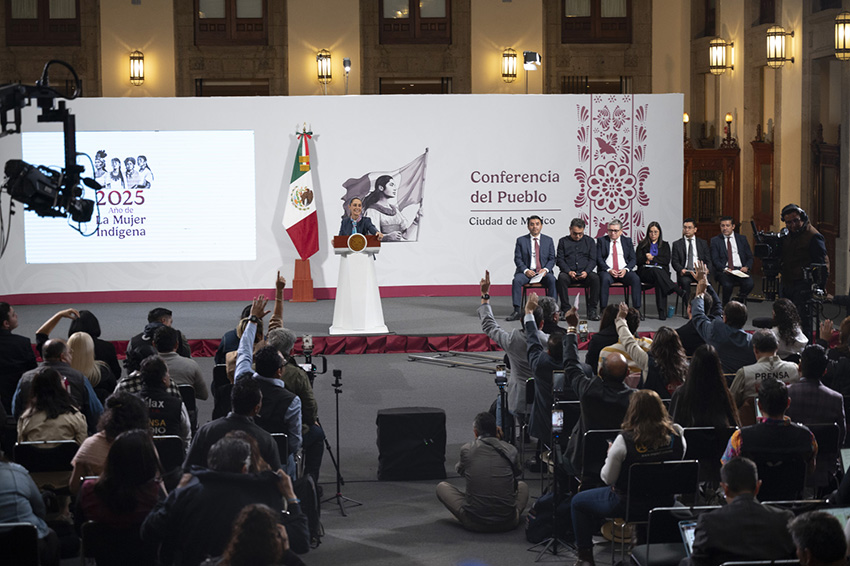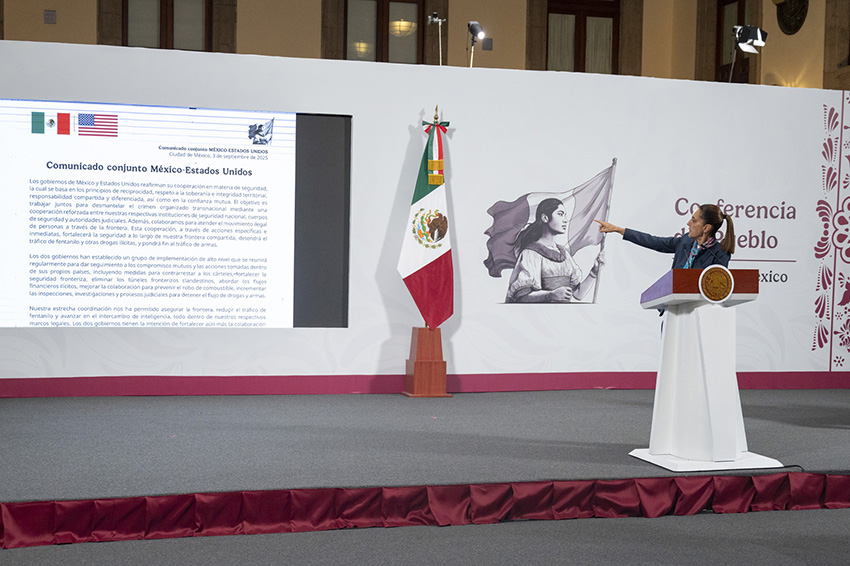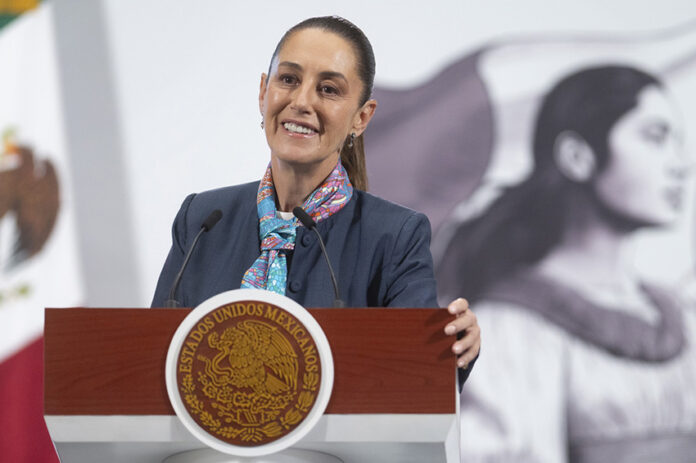A new security cooperation program announced by the Mexican and U.S. governments on Wednesday was a key focus of President Claudia Sheinbaum’s Thursday morning press conference.
Sheinbaum responded to several questions about the initiative, which was announced after the president met with United States Secretary of State Marco Rubio at the National Palace in Mexico City on Wednesday morning.
The new Mexico-US security program is ‘good for the country,’ says Sheinbaum
Sheinbaum said that the “cooperation program on border security and law enforcement” that was announced on Wednesday entails collaboration and cooperation between Mexico and the United States “in various areas,” including intelligence and training.
She said that Mexico and the United States will share information with each other to help authorities combat criminal threats in their respective countries.
Mexican and U.S. authorities already share intelligence, but there now appears to be a joint commitment to ramp up that cooperation.
It also appears that more joint training exercises will take place.
Sheinbaum and Rubio announce establishment of new bilateral security group
Sheinbaum indicated that Mexican military personnel will travel to the United States to undergo training offered by the U.S. armed offices and suggested that U.S. personnel could come to Mexico to receive natural disaster response training from the Mexican Army and Navy.
Rubio said on Wednesday that “joint training” is an important part of bilateral security cooperation and that Mexico and the U.S. plan to “amplify” that aspect of their security relationship.
Sheinbaum said that the meeting with Rubio was “very cordial” and contended that the result of it — a new security program that includes the establishment of a “high-level implementation group to meet regularly and follow up on mutual commitments” — is “good for the country.”
Sheinbaum spoke about a security agreement, but a ‘program’ was announced. What happened?
A reporter told the president that there was an expectation that there was going to be a “signed agreement” between Mexico and the United States, possibly with “more commitments” and a broader scope than what was announced on Wednesday.
“Did something change?” the reporter asked.
“There is a program,” reiterated Sheinbaum, who in recent weeks spoke about a new bilateral security agreement that she expected to be signed soon, before modifying her language last week to talk about a security “understanding.”

She acknowledged that she had spoken about an agreement, but told reporters that the Ministry of Foreign Affairs explained to her that “bilateral agreements that are signed have another characteristic,” one that includes “other diplomatic and foreign policy procedures.”
“… Perhaps I expressed myself poorly, … but the work program that was agreed yesterday was always on the table,” Sheinbaum said.
Sheinbaum: Rubio didn’t ask for more US agents to be allowed into Mexico
A reporter asked the president whether Rubio had requested that more U.S. agents be allowed to come into Mexico to join the fight against Mexican drug cartels.
“No, no, it wasn’t an issue,” Sheinbaum responded.
“They know that we have a protocol to approve agents from the different [U.S.] agencies. … We have a constitution that addresses that and the National Security Law. So, it wasn’t an issue in the talks,” she said.
In 2020, Mexico’s Congress approved legislation that regulates the activities of foreign agents in Mexico, removes their diplomatic immunity and allows for their expulsion from the country.
The legislation was seen as being aimed primarily at United States Drug Enforcement Administration and Federal Bureau of Investigation agents, who have long operated in Mexico.
Mexico not planning to send additional troops to the border region
Sheinbaum said that an additional deployment of Mexican troops to the northern border region is not part of the new Mexico-U.S. security program.
She said an additional deployment is not currently “necessary,” and stressed that the United States hasn’t asked for more troops to be sent to the northern border region.

The federal government deployed 10,000 National Guard troops to the border region in February as part of an agreement Sheinbaum reached with United States President Donald Trump that resulted in a one-month “pause” on a 25% tariff the U.S. government planned to impose on imports from Mexico.
The tariff took effect in March, despite the National Guard deployment, but USMCA-compliant goods were promptly exempted from the duty.
Which Mexican officials officials will participate in the Mexico-U.S ‘high-level implementation group’?
In a joint statement issued on Wednesday, the Mexican and U.S. government said they had “established a high-level implementation group to meet regularly and follow up on mutual commitments and actions taken within their own countries, including measures to”:
- “Counter the cartels
- Strengthen border security and eliminate clandestine border tunnels
- Address illicit financial flows
- Enhance collaboration to prevent fuel theft
- Increase inspections, investigations, and prosecutions to stop the flow of drugs and arms.”
On Thursday, Sheinbaum said that five Mexican officials (or their proxies) will represent Mexico in the group:
- Security Minister Omar García Harfuch.
- Defense Minister Ricardo Trevilla Trejo.
- Navy Minister Raymundo Pedro Morales.
- Foreign Affairs Minister Juan Ramón de la Fuente.
- Attorney General Alejandro Gertz Manero.
Sheinbaum: US commitment to combat arms trafficking to Mexico is ‘very important’
Marco Rubio on Wednesday declared that the U.S. government will “stop the flow of armaments” to Mexico and other Western Hemisphere countries.
On Thursday, Sheinbaum said she wasn’t aware if any other U.S. official, while in Mexico, had publicly acknowledged “the importance” of the U.S. authorities taking action to stem the flow of firearms to Mexico, where cartel members and other criminals commonly use illegally imported weapons to commit crimes including murder.
“So it’s very important,” she said.
Sheinbaum takes aim at PRI leader
After telling reporters that no plans are currently in the works for her to meet Trump face to face, Sheinbaum noted that Senator Alejandro Moreno, national president of the Institutional Revolutionary Party (PRI) and the instigator of a congressional brawl last week, was in Washington.
PRI chief physically attacks Morena’s Senate leader on the rostrum
On social media on Wednesday, Moreno said that he had participated in “very productive meetings” in the capital, and declared that he and the PRI would “never allow” a “terrorist and communist narco-dictatorship” to be installed in Mexico.
He and some other opposition politicians claims that Sheinbaum and the ruling Morena party are in cahoots with organized crime in Mexico.
Sheinbaum said that Moreno was making a fool of himself by traveling to Washington and claiming that her government is in bed with “los narcos.”
“And here Marco Rubio, the secretary of state, [was] congratulating us for the work we are doing on organized crime and [speaking about] the good cooperation there is,” she said.
Rubio said Wednesday that “the current security cooperation between the United States and Mexico is the “closest … we have ever had, maybe with any country.”
By Mexico News Daily chief staff writer Peter Davies (peter.davies@mexiconewsdaily.com)
